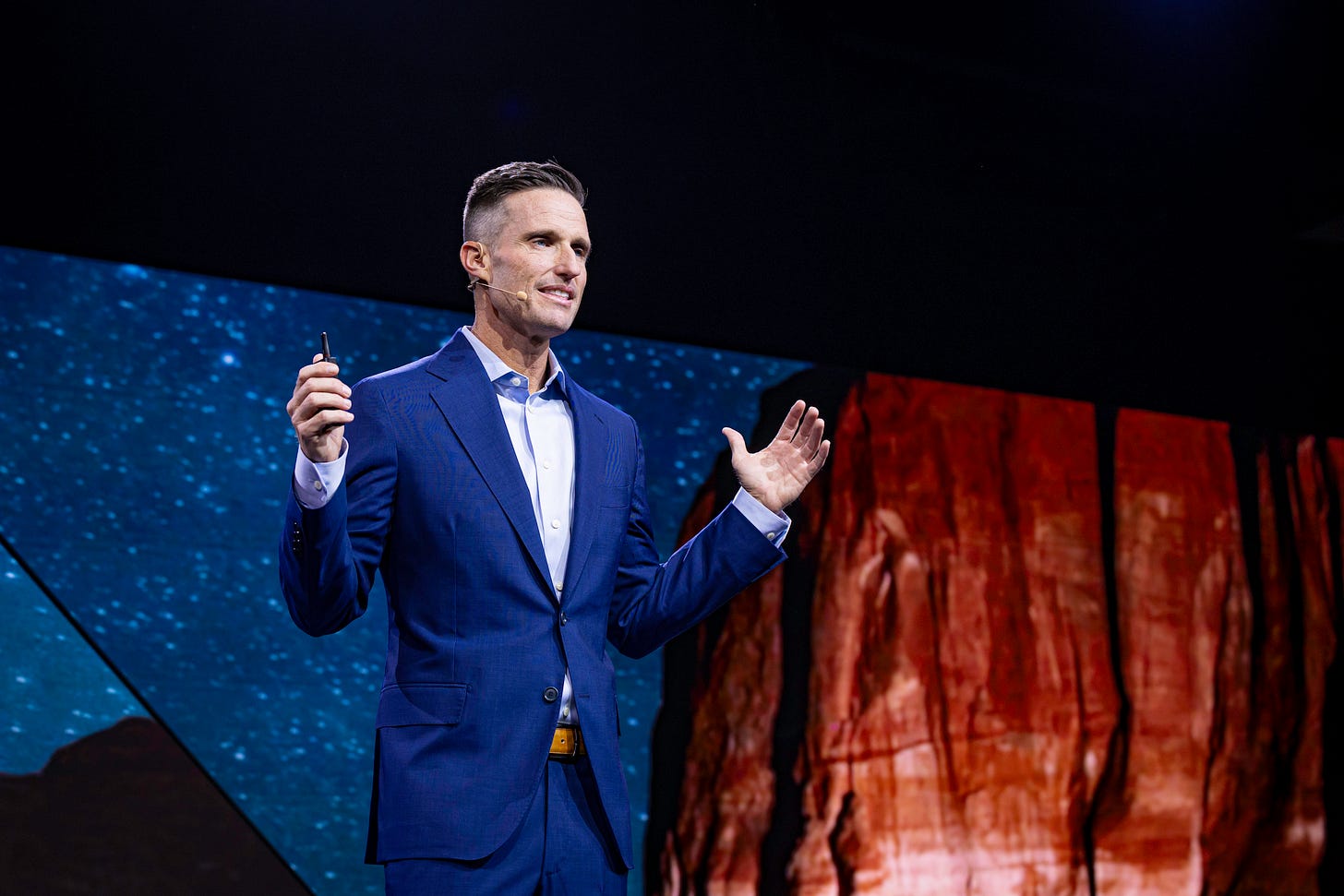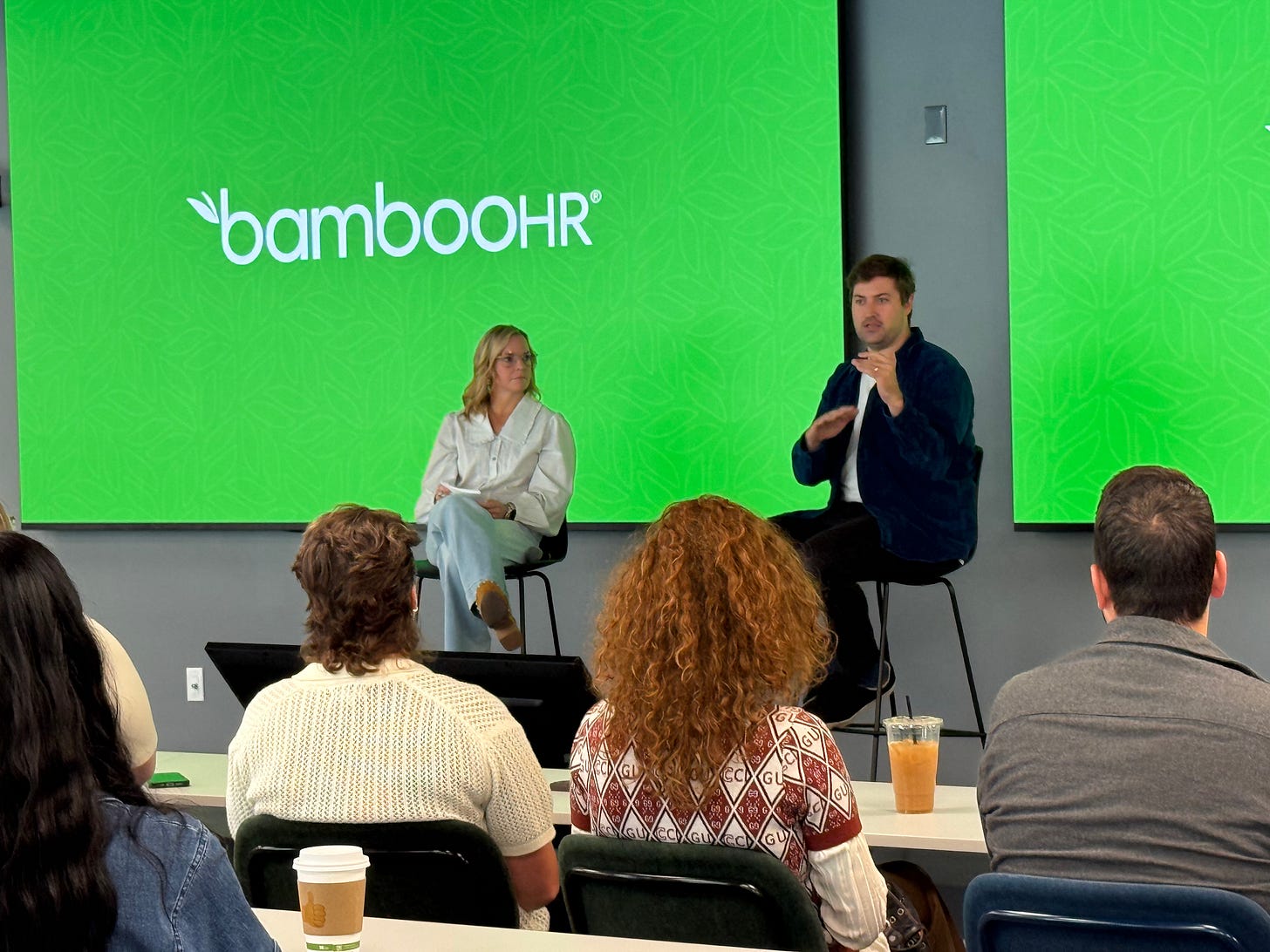As A Utah Startup Raises $400 Million, Here's What Peers Say About 'Silicon Slopes'
Upstarts was on the ground last week meeting with startup builders from Lehi to SLC. Just in time for legal tech Filevine to reach a $3B valuation with the backing of Utah billionaire Ryan Smith.

As he weaves up I-15 north from the nearly-finished training facility of his new NHL franchise, the Mammoth, Ryan Smith shifts gears in our conversation rapidly. Enough sports. Upstarts has to hear about his newest startup investment here in Utah.
In Filevine and co-founder and CEO Ryan Anderson, he’s found a kindred spirit: a startup founder with the ambition to bet on himself and go long, with a clear path to $1 billion in sales and a public company someday.
“I’ve only seen this once before in my career,” Smith says. “He’s not in it to sell it, he’s in it to win it.”
But Filevine didn’t initially need Smith’s help. When Smith, the billionaire co-founder of experience management software company Qualtrics, first offered to invest years ago, Anderson rebuffed him: the company was heads down and not raising. More recently, when Smith proposed bringing in VC firm Accel to co-invest alongside his new $1 billion Halo Fund, Filevine’s board of directors scoffed.
Founded in 2014 by three attorneys, Filevine’s legal software incorporates AI tools to help big law firms and government agencies better manage their cases, from court documents to phone logs and deposition videos. With close to 6,000 corporate customers and 100,000 legal professionals on its platform, Filevine is on pace to end the year with more than $200 million in annual recurring revenue. Contracts now span in the multiple millions of dollars, Anderson says.
“But when you’re a Utah tech company, and Ryan Smith calls you, you pick up the phone and hear what he has to say,” he tells Upstarts on Monday. “And he is incredibly persuasive.”
The result: Filevine is announcing that it’s raised $400 million in fresh funding in an all-equity round led by Halo Fund and Accel, with existing investor Insight Partners; other previous investors including Album Ventures, Meritech, Run Ventures, and Stepstone participated. The investment doubles Filevine’s valuation to $3 billion.
And $3 billion is also the number that Anderson says his startup has line-of-sight to reach in revenue soon enough. With its AI products sometimes 5x or 10x more valuable in contract sizes, “You don’t have to squint that hard to see it,” he says.
Which makes the investment — and collaboration with Smith — the perfect exclamation point on our visit to Utah’s tech scene, known as ‘Silicon Slopes,"‘ last week.
The trip was a reunion of sorts. In 2017, while still at Forbes, we wrote a print magazine feature about the growing cloud-based startup community in Utah; eight years later, it’s still one of our favorite stories from a decade leading the Cloud 100 franchise.
Right away with Upstarts, we knew we wanted to come back — this time, within our first six months — to ride along with the old guard and meet, across a jam-packed schedule of dinners, office hours and meetings, as many of the new generation of startup builders as possible.
Is Filevine the exception proving the rule, or is there a new pipeline of tech unicorns following in Smith’s steps at Qualtrics? Where is Utah’s ecosystem underrated? Where does it still need work? Has the AI craze been a boon, or a distraction?
Those questions are worthy of multiple articles and stories in the months to come. For now, our favorite answers, from a mix of founders and startup leaders, are below.
Presented By Vanta.
Building Trust in the AI Boom: Join the Virtual Event
In today’s AI boom, shipping fast gets attention—but building trust gets results. Startups now face higher expectations earlier than ever, with investors demanding clean financials and enterprise buyers requiring strong security before deals close.
With the right systems, trust shifts from a checkbox to a growth engine—and that’s where Vanta and Mercury step in, equipping early-stage teams to build investor and enterprise-grade credibility without slowing down.
Join the live webinar tomorrow with leaders at Vanta and Mercury to learn learn how to:
Pass investor diligence with confidence and fewer follow-ups
Avoid security and procurement blockers before they stall a deal
Stay ahead of compliance and risk without hiring full teams
Demonstrate capital discipline in a market that rewards it
We went deep on what Utah startup founders were thinking and facing in 2017. Here’s what they’re saying in 2025.
On startup timelines
“I think people still under-estimate Utah. There are still the big revenue generators, but also other types of companies now, like Divvy [acquired by Bill.com for $2.5 billion in 2021]. A more rapid-fire way of building worked.” — Dave Grow, CEO of Lucid, a work software unicorn
“I’m seeing it more and more with other sales leaders that are my friends at other orgs: they’re going full velocity. ‘Let’s go raise, let’s go get this.’” — Bryce Brinkman, vice president of B2B people and office manager Kadence
Upstarts is about to celebrate six month in operation. As a subscriber-funded publication, we couldn’t do it without your support. To celebrate, subscribe for a year and get 20% off for a limited time.
On local talent
“All these door-knocking companies are based here. If you went through college and didn’t have free lunches from recruiters, you were doing something wrong.” — Anonymous consumer startup founder
“The only thing that’s missing is proximity to the customers, like in New York or San Francisco. So long as they’re okay to do a 2-hour or 4-hour flight, I’ve got all the talent that I need right now.” — Bryce Brinkman at Kadence
“The market doesn’t feel as frenzied as it did a few years ago.” — Dave Grow at Lucid
“We moved out someone from the Bay Area. You need someone in consumer that understands consumer marketing, and Utah is a SaaS state.” — Joseph Woodbury, founder and CEO of storage marketplace Neighbor
“We’re in a knife fight, so it’s like, ‘What talent can we get?’ And we went out of Utah.'“ — Anonymous startup founder
“Startups needing to look out of state for talent isn’t a uniquely Utah problem. We could use more engineers in Seattle, too.” — Ryan Smith, founder and executive chairman of Qualtrics
On AI and defense tech prospects
“If you were starting a fashion e-commerce company in West Virginia, it’s probably not the same as starting it in Los Angeles.” — Anonymous AI startup founder
“There probably isn’t enough talent to build a world class AI company in Utah, not yet, but that doesn’t mean it can’t be built.” — Ryan Anderson at Filevine
“People are sleeping on defense tech in Utah.” — Greg Levesque, co-founder and CEO of strategic intelligence provider Strider Technologies, who has hired Mormon government staffers back from Washington, D.C., and notes a local major NSA data center and Hill Air Force Base
On fundraising
“Women raise just 2% of venture dollars nationally, and it’s even lower here. I think we’re getting better, but we have a whole lot of room to grow.” — Anonymous female startup founder
“Every founder that has something to sell should find sales talent in Utah. But I always advise founders that I wouldn’t start fundraising here: It will slow your round down.” — Renato Villanueva, founder and CEO of financial modeling software startup Parallel
“Here we have about six firms, so if one’s out, they’re all out. Talk to investors here in Utah, and it’s like, ‘You didn’t find me because I’m unique or special, you fond me because I’m one of the six people.’ The bar is just higher.” — Anonymous startup founder
“Everyone is so loud in Silicon Valley, so early, that you can start to think they’re doing better than they actually are.” — Ryan Anderson at Filevine





Love that you LOVE Utah so much! A great untold story of the national startup ecosystem that you come back to time and time again. Own it!
Utah ecosystem is fascinating to me. BYU and LSD has done tremendous job investing in the local talent and I think it shows.
Also, I didn’t realize Lucid was from Utah, love their platform!